SWEDISH SOUTH ASIAN STUDIES NETWORK
Visit to North Eastern Hill University, Friday 25 November
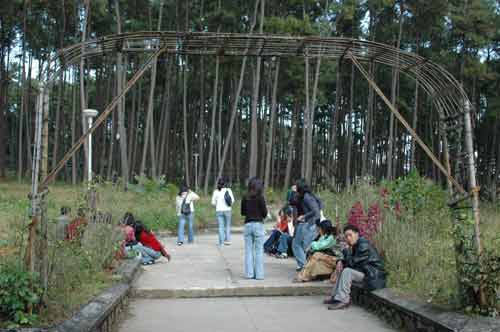 Web
page: http://www.nehu.ac.in/
Web
page: http://www.nehu.ac.in/
North Eastern Hill University (NEHU) in Shillong is a rather small university founded in 1974, with students coming from all over the North East. There are about 200 teachers and 2 000 students at the PG level, that is, the masters level. The university, beautifully located in a hilly area covered by pinewood trees, is divided into six schools:
• Education, which is the biggest school
• Social sciences (sociology, political science, history, and law)
• Physics
• Life sciences
• Economics and Management
• Human and Environmental Studies (including anthropology)
Researchers/teachers come from all over India. There are about 50 colleges affiliated with about 30 000 undergraduate students.
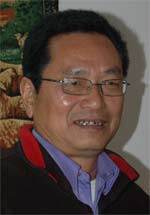 Our host, Prof.
C. Nunthara (photo to
the left) from the Dept. of Sociology (and also Dean of the School
of Social Sciences) told us that this department has seven teachers (should
be 11 actually) and 90 Masters students. There are about 20 PhD students.
M Phil is on the way out and has only few students now.
Our host, Prof.
C. Nunthara (photo to
the left) from the Dept. of Sociology (and also Dean of the School
of Social Sciences) told us that this department has seven teachers (should
be 11 actually) and 90 Masters students. There are about 20 PhD students.
M Phil is on the way out and has only few students now.
Some departments have already skipped this level altogether. Initially,
Sociology and Anthropology was included in one department, but in 1981,
when the university also wanted to develop Physical Anthropology, the
two twin sciences were separated. However, research interest and methodology
overlap between the two departments today.
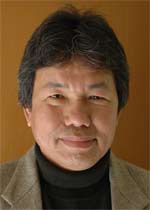 The university
has a fair number of foreign collaborations in the Physical and Life Science
areas, where MOU’s have been forged with Japanese and German institutions.
Similar collaborations are much less in the humanities and social sciences.
The university
has a fair number of foreign collaborations in the Physical and Life Science
areas, where MOU’s have been forged with Japanese and German institutions.
Similar collaborations are much less in the humanities and social sciences.
13 people gathered at the meeting with us, organised by Prof. Nunthara and Prof. T.B. Subba (photo to the right) , anthropologist and Dean of the School of Human and Environmental studies. They represented Sociology, Anthropology, Political Science and Philosophy. Other disciplines had not been attracted by the call for the SASNET meeting, maybe not properly informed about our ambitions to network among all the sciences.
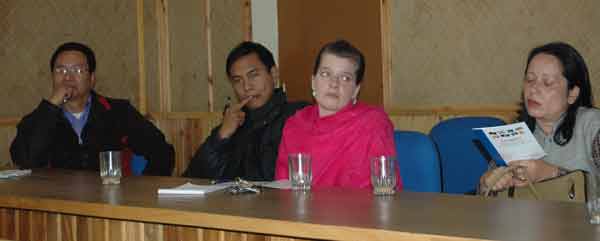 The
main thrust of research at NEHU is socio-cultural and biological variety
in the North East. However, most of the research undertaken is donor driven
and relates to environment, health and identity. One interesting combination
is medicine and physical anthropology, the latter rather than ‘measuring
skulls’, engaging in medical examinations of physiological traits
of various people in the area. More specifically:
The
main thrust of research at NEHU is socio-cultural and biological variety
in the North East. However, most of the research undertaken is donor driven
and relates to environment, health and identity. One interesting combination
is medicine and physical anthropology, the latter rather than ‘measuring
skulls’, engaging in medical examinations of physiological traits
of various people in the area. More specifically:
Political science researchers are engaged in a variety of studies relating
to tribal development, ethnicity and identity, and conflict patterns (peace
studies). They are also working on regional cooperation and globalisation,
and on the conflict between India and Pakistan.
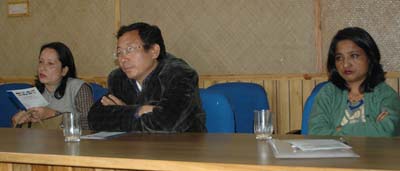 Sociology
researchers engage in a vast canvass of social changes taking place, a
development they both want to monitor and participate in as active agents
of change. Historically a turning point in the social transformation here
is the conversion to Christianity and the coming of modern education,
which is therefore an object of study. More recently, the conflict between
indigenous people and settlers, and the development of delinquency and
drug addiction among young people catch their attention.
Sociology
researchers engage in a vast canvass of social changes taking place, a
development they both want to monitor and participate in as active agents
of change. Historically a turning point in the social transformation here
is the conversion to Christianity and the coming of modern education,
which is therefore an object of study. More recently, the conflict between
indigenous people and settlers, and the development of delinquency and
drug addiction among young people catch their attention.
Anthropology researchers, finally, engage in a variety of studies with
an attempt at a holistic approach. They identify with the British social
anthropological tradition with fieldwork and social interaction and have
no major tussle with the sociologists. In fact, both disciplines take
an active interest in the kinship system of Meghalaya and its contemporary
transformation. Identity and gender studies are also high on the agenda.
A common complaint is that there is lack of money to study the many
smaller tribes of the North East. Donor driven research does not allow
for that, which means that the task of ethnographic documentation of these
groups remains unfinished. Soon much of their special and unique features
may have been lost in the ongoing social transformation.
Prof. T.B. Subha from the Anthropology department informed us that he
has a collaboration with the Centre
National de la Recherche Scientifique (CNRS) in Paris, about the study
of identity and its political, economic and environmental aspects. As
an example, he tells about the hill tribes who settle in the plains and
develop a new identity. Besides Prof. Subha has been involved in a long-standing
research collaboration with Dr Beppe Karlsson
from the Dept. of Cultural Anthropology and Ethnology,
Uppsala University for the past 20 years. In 1997 Beppe wrote his doctoral
thesis in Social Anthropology (at Lund University) about the Rabha community
in Assam, and more recently they have together edited a book called ”Indigeneity
in India”, which was published in the end of 2005 in London.
Researchers we met at NEHU:
• C. Nunthara, Professor of Sociology,
Dean of the School of Social Sciences. Research interest: Sociology of
North-East India; Resource conflicts between indigenous people and settlers
• T.B. Subba, Professor of Anthropology.
Research interest: Identity, culture and development
• Niklesh Kumar, Professor
of Sociology. Research interest: Sociology of medicine, occupations and
professions
• L.S. Gassan, Professor of Political
Science. Research interest: Government & politics in North-East India
• Dr. Elisabeth Laitflang,
Dept. of Political science. Research interest: Tribal institutions in
North-East India
• Biswajit Mohapatra,
Dept. of Political science. Research interest: Conflict & peace, regional
cooperation, information technology
• John Kayina, Research
scholar in Sociology
• A.K. Nongkynrih, Reader
in Sociology. Research interest: Sociology of Development and Sociology
of Entrepreneurship and Management. Besides, he is a facilitator of Appreciative
Inquiry and Sustainable Livelihood Approaches. He is also a facilitator
of Community Development in the North-Eastern region and is associated
with many national and international organizations.
• Immanuel Zargosangvaik,
Research scholar in Anthropology. Research interest: Development studies
• Lucy Zehol, Reader in Anthropology.
Research interest: Theory, women and development
• Berit Fuhrman, Guest lecturer
in Social Anthropology (coming from the South Asia Institute, University
of Heidelberg, Germany). Research interest: Ritual healing, social structure
and kinship
• Valentina Pakyntein,
Lecturer in Anthropology. Research interest: Matrilineality & gender
• Xavier Mao, Dept. of Philosophy
SASNET - Swedish South Asian Studies Network/Lund
University
Address: Scheelevägen 15 D, SE-223 70 Lund, Sweden
Phone: +46 46 222 73 40
Webmaster: Lars Eklund
Last updated
2008-02-08
